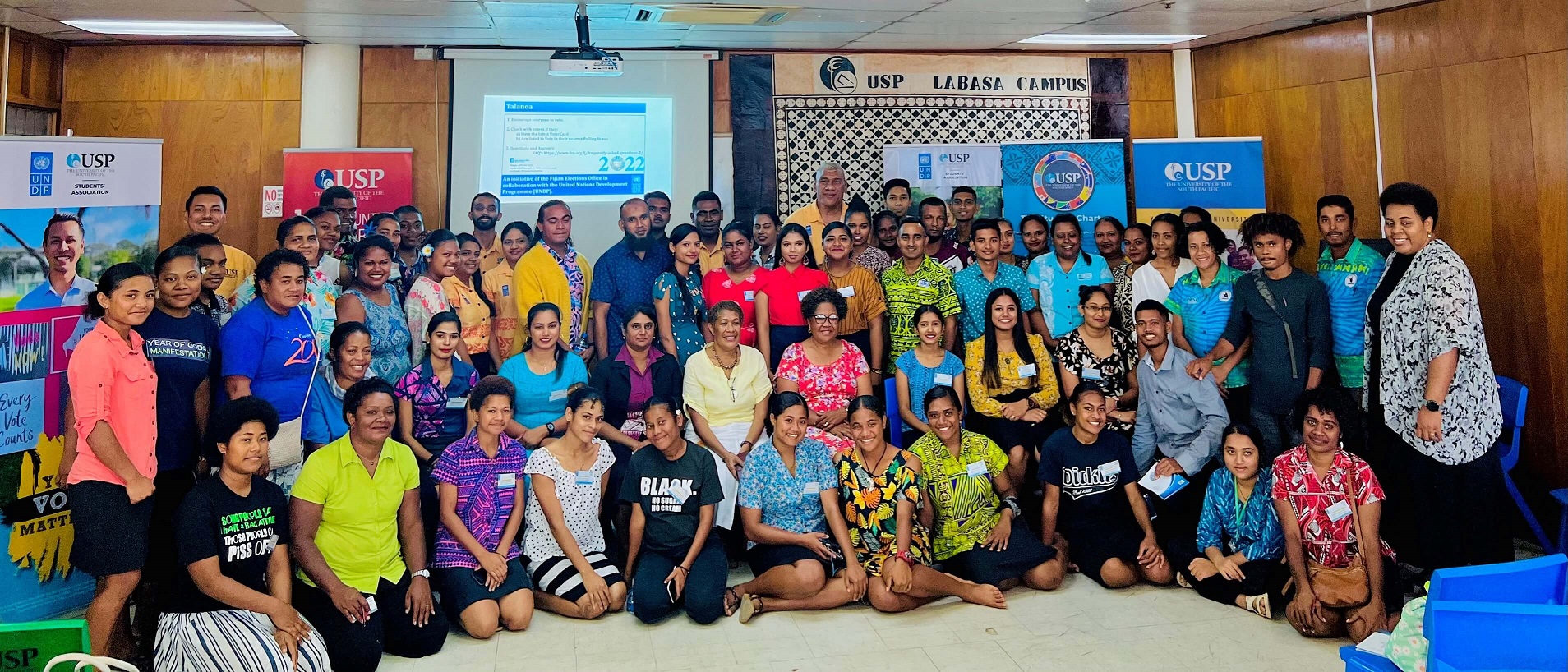Growing up, you were probably tempted to think that politics was just a boring old topic and best suited for old people.
But the truth is — you’re never too young or too old to form an interest in politics or hold a political opinion.
And on the topic of elections, understanding who we tick that box for matters. With elections just around the bend and Fijians rushing to do their last minute registration this week, voting must be at the top of every eligible voter’s mind.
According to Fijian Elections Office statistics, as of October 28 the number of 18 to 20 year-olds stood at 37,262 and the cohort of voters aged 21 to 30 was 156,127.
There’s no doubt, youths around Fiji are preparing to participate in the upcoming elections. Young people were the driving force behind the 2018 elections. Experts believe this election will be no different.
On Wednesday this week, University of the South Pacific held its final workshop on, ‘Your Vote Matters’, which was a joint project of the USPSA, FEO and the United Nations Development Programme.
The Sunday Times team spoke with a few youth voters.
They said the leaders they wanted to lead Fiji must portray qualities of honesty, transparency, accountability with a people-oriented personality.
Among those who attended was second year university student, Leila Gonewai. She said she was ready to cast her vote and influence political change in Fiji come December 14.
“My dad has been into politics ever since I could remember, he always studied all the different political parties and is now even working for one,” the 21-year-old said.
“My siblings and I would ask so many questions and we’re lucky to have a family that is willing to inform us about elections.
“When it came to voting (mock exercises) since it’s my first time, I was a bit skeptical of what to do and if it would really matter.”
When it came to conversations with her peers surrounding politics and elections, it was a totally different story.
“At home our conversations were treated calmly but if your go out and ask questions of what party are you voting for or which party seems to have better agendas and what not, it would be met with aggression most of the time.”
Ms Gonewai said decisions about the economy, budgeting for development were topics often discussed within her group of friends.
“In my normal conversations, I do not hold back, I speak my mind, which often offends a lot of people.
“Who we choose to govern the country will change the course of this nation and I’d like to see change in the way women are treated.”
“We’re a developing Pacific Island country where domestic violence is at the top so what I would want to see are more laws surrounding domestic violence, on how women are better treated in workplaces, at home, in churches and the community.”
Gonewai feels there is a good percentage of youths that know what was happening and are looking forward to voting while the other group consists of those who weren’t interested.
“That group that doesn’t know what to do, they don’t know who to vote for so what they mostly do is not vote at all and they don’t realise that their vote counts. For 21-year old Patrick Yalimai, a nation where democracy is at its truest form is what he hopes for when he casts his vote for the first time in December.
“These days, if people do not stand up for what they believe in and what they want for their nation to prosper then nothing good can come out,” he said.
“We need everyone’s opinions, voting doesn’t not always mean that you go and write on paper or who will be a transparent leader of the nation, it’s more of making an impact of what is right.
“I have a ta levu (dad’s older brother) who is in Parliament and so most of the time when he visits, there are talks surrounding political views and whether the leaders of our nation are doing enough for the people.
“If I were to have children they would be affected with what is going to happen now and in ten years’ time, if one is not interested in politics then they’re being ignorant of how their future will turn out.”
Sailasa Draunibaka feels that creating a space within family settings creates an atmosphere of openness, fostering interest among young minds.
“When I’m back home in Vanua Levu, politics is a topic that is discussed and we respect each other’s opinions even though a member of our family may represent another party, it’s an open conversation.
“I’m glad that our parents allowed us to express ourselves and how we feet about certain things.
Draunibaka says the needs of youths are interlinked with the decisions made by an elected government and what better way to safeguard one’s future than through the ballot.
Shahil Kumar feels the election provides young people with an opportunity to choose a leader that does not limit the nation but addresses important gaps in economic standards and enforces human rights laws.
“Fiji being a democratic allows its citizens to vote freely, however, I believe there are still some loopholes that need to be looked at and also believe that electronic voting will be a really good advancement in terms of voting,” he said.
“I want a leader who incorporates modern advancements while preserving the nation’s cultures and practices.”
A youth voter who wished to remain anonymous said that he voted in the previous 2018 elections but has now decided that his vote would be of no use.
“It’s basically just false promises, doesn’t matter what political party comes into government, the result is the same,” he shared.
“Everything is to basically to benefit the politician and the incentives provided to normal citizens could have repercussions in the future.”






